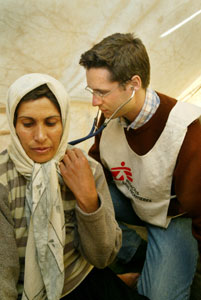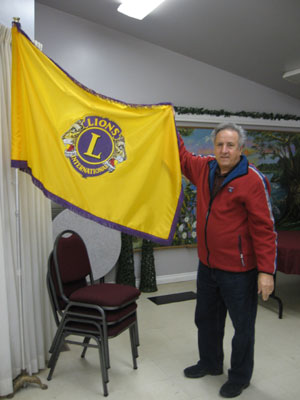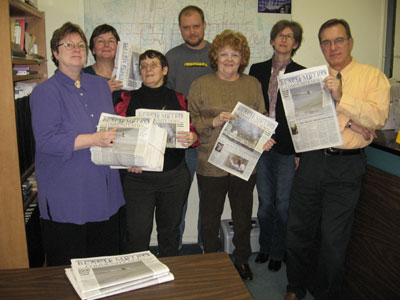9. Your community centre also offers international programs. What do they involve and what is their objective? Who came up with the idea and how are these programs funded?
Scadding Court strongly believes that some of the most important learning takes place not in the classroom, but in the experiences and activities of “living life”. SCCC also believes that one of the greatest life experiences is international travel. By immersing oneself in the language, culture and heritage of others, even for the briefest time-period is an exercise in cross-cultural awareness that broadens one’s outlook and perspective on life. Since 2001 SCCC has been acting on this belief by taking young at-risk youth an international trip as part of the SCCC International Program.
All programs are funded through SCCC’s fundraising initiatives directed towards the various projects.
We are proud of the partnerships that we have developed to support our international work and invite anyone and everyone who is in travel and tourism to consider the benefits of providing “at risk” youth the opportunity to travel to other parts of the world to engage in a meaningful life experience. My door is always open to engage people on this or any other SCCC program.
Toronto youth ride with Mongolian nomads
10. Please tell us more about your international project(s) in Mongolia.
In 2001 Scadding Court led a 14-person youth ambassador delegation to China and Mongolia. The group consisted of 8 area youth and 4 adult chaperones. In the capital of Mongolia (Ulaanbaatar) the group engaged in a variety of activities and experiences with their local counterparts to promote international solidarity and goodwill among young people. The youth also had the chance to spent time living with Mongolian nomads in remote areas in the countryside. They also played organized basketball games with local Mongolian youth. This gave them a chance to interact, communicate and engage with each other in unique and novel ways.
11. Please tell us more about your international project(s) in China.
In the late summer of 2002 Scadding Court Community Centre took a basketball team to China to participate in the First Great Cities of the World Friendship Invitational. Scadding Court Community Centre, China International Sports Bureau, and the Democratic Youth Association of Mongolia were the organizing agencies for this event.
The delegation team from Toronto was made up of 14 people (11 youth and 3 chaperones). The Canadian youth were between the ages of 16-18 years old and in high school. The participants coordinated and ran basketball clinics and workshops form their Chinese and Mongolian counterparts. The Mongolian youth players picked up basketball at a high level and their understanding of the game of basketball was surprisingly in keeping with the style of North America.
All 11 youth, were from a different ethnicity, representing the diverse cultural make-up of our community and the city. Ethnicities represented in the group included Somalian, Chinese, Grenadian, Yugoslavian, Polish, Guyanese, Brazilian, Afro-Canadian, etc. For most of these youth it was their first opportunity to travel outside of Ontario.
International learning experiences in China
12. Please tell us more about your international project(s) in India.
In August of 2003, Scadding Court Community Centre’s International Youth Program took local, at-risk, young Toronto youth overseas to India where they performed a benefit concert for street children in New Delhi. In addition to the concert the youth were also the subject of a documentary film “Chords, Chaos and Karma” which chronicled their experience.
The success of this project led SCCC to develop a partnership with the Society for Remedial Education, Assessment, Counselling, for the Handicapped (REACH). REACH is a NGO based in West Bengal that provides education to children living with disabilities. REACH and Scadding Court were partners in a unique project to establish and support a school in a village in the state of Tripura in Northern India, and to develop recreational programming to complement the education children receive through formal schooling.
The success of all these projects has encouraged SCCC to continue this type of work, therefore we are entering into a partnership with Kolkata based NGO Durbar Mahila Sammanaya Committee (the Committee for Coordination of Indomitable Women). DMSC has a membership of about 65,000 sex workers and their children and is active in working toward a secure social existence and a better life for sex workers and their families.
Toronto youth give a concert in India
Continuing our work to support education initiative international SCCC is committing to support the expansion of DMSC residential school program. Rahul Vidyaniketan (Rahul School) is a residential home for children of sex-trade workers located in Bauripur, in the southern outskirts of Kolkata, West Bengal. Located on several acres of land, the complex currently houses 49 students aged 4 to 14 years old and supports several income generating agricultural enterprises including rice and wheat farming, the cultivations of okra and prawn. The children that live there attend the local government run school, but live at the DMSC residential complex. These children are born and raised in the brothel environment, generally do not attend school, are socially stigmatized and are at great risk of being drawn into prostitution at an early age, particularly girls. Our project will support the educational opportunities to these children to help break the generational cycle of prostitution and social exclusion into which they were born.
SCCC in partnership with Toronto Community Housing is also developing one-year intensive intervention project for diverse “at-risk” Canadian youth from Toronto Community Housing communities. Through an international work exchange in West Bengal India, participants will be presented with a life-changing experience. The four month oversees internship will provide a real opportunity to “at-risk” youth to experience the world and make life-changing decisions. This experience will not only allow for the development of a wide range of skills, but will transfer these youth from their current negative environments and routines to an entirely new setting. Through this they will have the chance to develop a new perspective on their lives, their values and their futures. In a post-internship placement the participants would be mentored through a customized program to obtain employment, return to school, enter a trade or pursuer other productive enterprise.
Toronto youth work with Indian youth
13. What impact do these projects have on young people?
Cross-cultural learning and exposure to different ways of life enhance the ability of young people to better understand and appreciate the diversity and strengths that Canada, as a country, is able to offer its citizens. And to develop a sense of global connectivity to other young people overseas. Youth expressed that exposure of this kind has challenged their perceptions of the world and the value systems they are familiar with, bringing about a new awareness of systems, cultures, peoples, traditions, and ways of life.-all positive youth development.
As noted the 2003 trip had a documentary produced about the trip and the experiences of the youth participants. In the film one youth after traveling through the slums of Delhi remarks “I thought I lived in the ghetto, but this is the real ghetto” it is this kind of understanding that we are trying to encourage in all the young people in all our program
Kevin, thank you so much for taking the time to tell us about your organization’s initiatives. Cross-cultural learning experiences like these are truly life-changing and they can do so much to create a better future for marginalized youth right here in Toronto. I wish you all the best for your endeavours and please keep us up-to-date on your initiatives.








